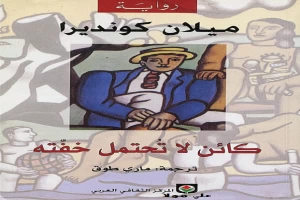Newly released
This book is new and will be uploaded as soon as it becomes available to us and if we secure the necessary publishing rights.

كائن لا تحتمل خفته Book PDF
(0)
Author:
Milan KunderaNumber Of Reads:
31
Language:
Arabic
Category:
literatureSection:
Pages:
50
Quality:
good
Views:
990
Quate
Review
Save
Share
Book Description
Milan Kundera
Milan Konedra was born on April 1, 1929, to a Czech father and mother. His father, Ludvik Kundera (1891 - 1971), was a musicologist and rector of Brno University. Kundera wrote early poetry during high school. After World War II, he worked as a merchant and as a jazz instrument player before continuing his studies at Charles University in Prague, where he studied music, cinema, literature and ethics. He graduated in 1952 and then worked as an assistant professor and then a lecturer for the subject of world literature at the Faculty of Film at the Prague Academy of Performing Arts. During this period, he published poetry, articles, and plays, and joined the editorial department in a number of literary fields. Kundera joined the Communist Party in 1948 with enthusiasm, as did many Czech intellectuals at the time. In 1950 he was dismissed from the party due to his individualistic tendencies, but he rejoined its ranks from 1956 to 1970. During the fifties Kundera worked as a writer, translator, essays and playwright, and in 1953 published his first collection of poetry, but he only gained attention with his collection of short stories. The first (Laughing Loves) 1963. After the Soviet invasion of Czechoslovakia on August 21, 1968, Kundera lost his job as a teacher because he was one of the pioneers of the radical movement in what was known as the (Prague Spring) and his books were banned from circulating in bookstores all over the country in 1970. In 1975 Kundera became a guest professor at the University of Rennes in Brittany, France. In reaction to his 1978 novel, The Book of Laughter and Forgetting, Kundera was stripped of his Czech citizenship, but he was granted French citizenship in 1981. Since 1985 Kundera has insisted on conducting written dialogues only because he feels that it has been sometimes incorrectly translated into the languages into which his works have been translated. , and he says on this point precisely in one of his dialogues (Unfortunately, those who translate our works betray us, they do not dare to translate the extraordinary and non-general in our texts, which is the essence of those texts. They are afraid that critics will accuse them of mistranslation and protect They are making fun of us themselves.) His first works, which he wrote in French, were (The Art of Novel) 1986, followed by the novel (Immortality) 1988. As Kundera was a lecturer in comparative linguistics at the University of Rennes for several years, he was able to sign a contract with the famous Gallimar house starting in 1978.
Book Currently Unavailable
This book is currently unavailable for publication. We obtained it under a Creative Commons license, but the author or publisher has not granted permission to publish it.
Rate Now
5 Stars
4 Stars
3 Stars
2 Stars
1 Stars
كائن لا تحتمل خفته Quotes
Top Rated
Latest
Quate
Be the first to leave a quote and earn 10 points
instead of 3
Comments
Be the first to leave a comment and earn 5 points
instead of 3